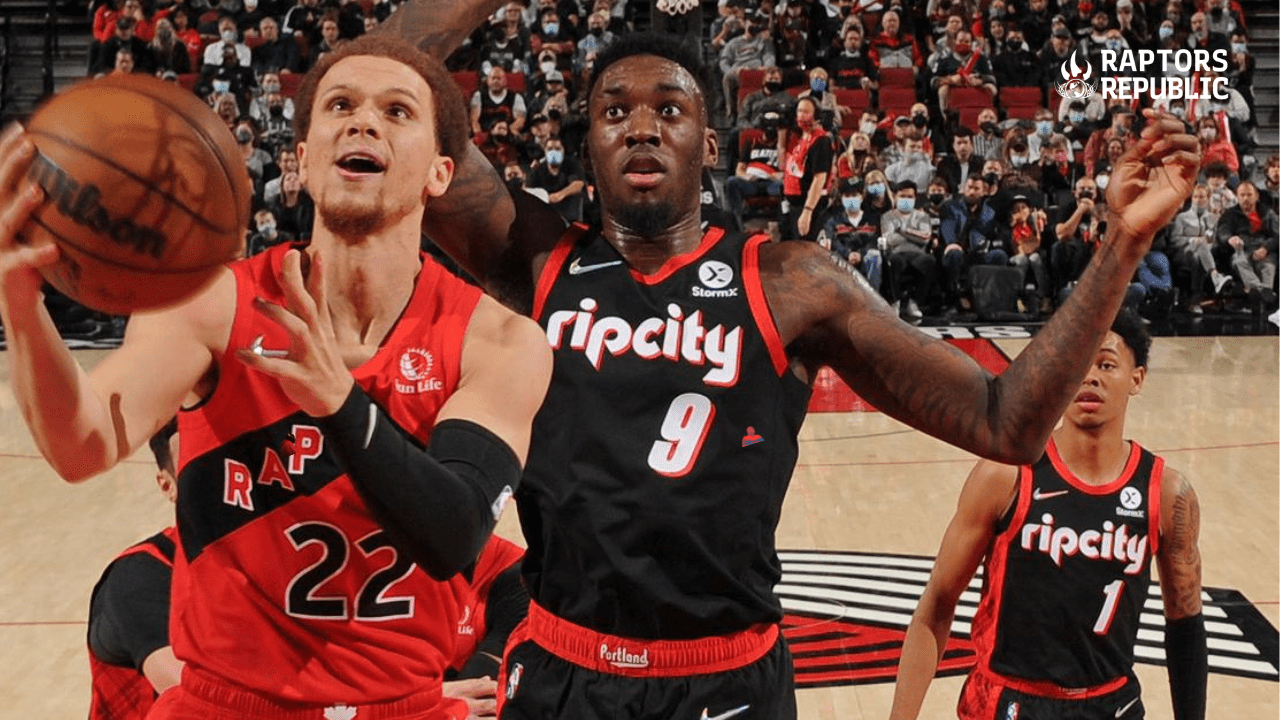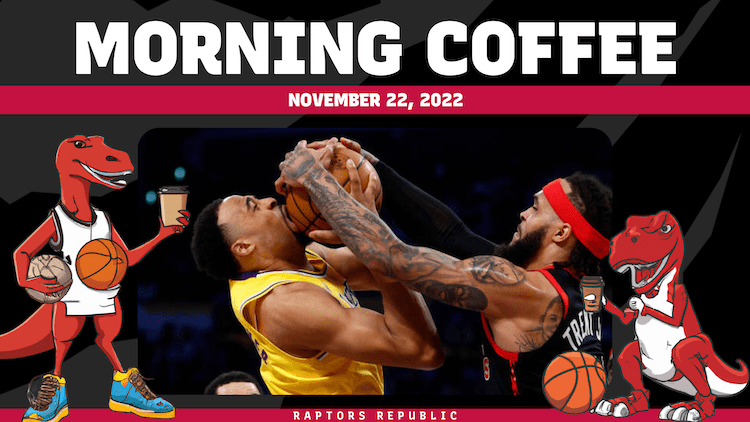Masai Ujiri and the Toronto Raptors have had great results with late draft picks. Norman Powell, Pascal Siakam, O.G. Anunoby, Christian Koloko, and others have all been selected at either the end of the first round or the beginning-to-middle of the second round. The Raptors aren’t guaranteed success — look no further, of course, than Bruno Caboclo, chosen 20th. That’s a spot that rarely results in an NBA career, but it’s almost a surprise when a player selected under such circumstances by Raptors ends up walking the normal route out of the league.
Which brings us to Malachi Flynn.
Drafted 29th in 2020, Flynn still hasn’t earned a consistent spot in the rotation from Nick Nurse. He averaged 19.7 minutes per game in his rookie season — which seems consistent enough! — until you realize that he averaged 3.1 minutes per game over the first 40 games of the season, when he was plagued by Did Not Play — Coach’s Decisions and simply being left off the active game roster. He did play in every game from 41 onward, but much of that game after the Raptors suffered a huge rash of injuries, as well as shutting players like Kyle Lowry down.
Flynn himself played great when he started, averaging 14.9 points and 5.5 assists per game in the 14 he didn’t come off the bench. But there is cause for that. Starting point guards get to run pick and rolls and control the offense, and Flynn has always been better with more responsibilities. Of course, the Raptors lost a lot, and though it wasn’t Flynn’s fault, it served to show that Flynn was wrongfully placed as the ball-dominant guard for an NBA team. Yet when playing next to Toronto’s more ball-dominant players, he has never found his niche. And he was never going to displace the stars. That paradoxical success in difficult circumstances and failure during easier ones has been the knock, leading to such inconsistency in his role and performance, until this past week.
Flynn has played in four of Toronto’s last five contests, and he’s done so in a normal role for a bench guard like him. He hasn’t been starting. He hasn’t been running a whole lot of sets. He’s mostly been standing off the ball, making quick decisions when it reaches him, and playing fantastic defense.
Flynn is passing less and scoring more. He’s spending almost the same frequency of time running pick and roll or isolation as he has his entire career, but he’s now doing it to be a scorer. Much of it is second-side action, after a teammate has already forced a rotation and he’s able to attack weaknesses. And he’s been terrific at converting offense against weaknesses.
Most importantly, Flynn is shooting a scorching 48.3 percent from deep. It won’t stay that high, but he’s a good shooter, and he’s taking easier shots than he has in past seasons — he attempted more pullups than catch-and-shoot triples in his rookie season. That’s no longer the case today. (Of course, it helps that he’s making his pullups at a ridiculous rate, over 40-percent accuracy, which he never has before and likely won’t continue to do quite so effectively.)
He has great craft inside the arc, though. At one point he ran a pick and roll, snaked to the other side of the floor, put his man in jail behind him, and then hit a lefty floater after engaging the big. That’s an impressive sequence of decisions and executions for any guard! It’s important to note he did it when facing bench players for the Atlanta Hawks.
It’s not just on the offensive end. Toronto’s defensive intentions are catalyzed by tenacious on-ball defense. It’s significantly harder to force turnovers when the player on the ball gives up blowbys. Then rotations are reactive, to plug a leak. If the initial ball defender stays in front of his man on the drive, then rotations are proactive. When the initial defender forces the ball to stop, slow, or turn, then the rotations behind him complicate passes. Digs at the ball are to force turnovers rather than misses. Everything is unlocked as a weapon.
Flynn has been fantastic at staying in front of drivers. He is consistently forcing even the speediest guards to change direction when driving, and even if he’s individually not gathering a whole bunch of steals or blocks, they are only possible because of his incredible work moving his feet and keeping between the rim and the ball.
As a result of Flynn’s success and Nurse’s success in putting him in more advantageous situations, Toronto’s offensive rating with Flynn next to any of Fred VanVleet, O.G. Anunoby, Scottie Barnes, or Pascal Siakam has been excellent, according to PBP Stats. That is exactly the opposite of Flynn’s marks in his first two seasons, with Toronto’s offense hamstrung when Flynn played alongside VanVleet or Siakam. Some of this is chicken-and-the-egg stuff: Is Flynn succeeding because the team is using him better, or is the team using him better because he’s succeeding? (The answer is surely a little bit of both.)
For the first time Flynn’s role — and his performance within it — feels replicable. It’s important to note that he hasn’t broken his scoring career high this season. In fact, he hasn’t broken his career high in any category. He’s no longer running the team for full, sad games and lifting his season averages that way. He hasn’t started a game yet this season. Instead, he’s playing an actual role that doesn’t change dramatically from game to game. His playing time is centralized around the end of the first and third quarters and the start of the second and fourth, and he is playing against opposing benches with one or more of Toronto’s stars alongside to make his job easier.
Flynn hasn’t had anyone making his job easier to this point in his career. He’s been running uphill, playing most when Toronto has been ransacked by injury, and he’s by and large been failing to lift the team to wins. That’s expected. He’s finally being asked to do normal stuff, rather than Herculean, and he’s responding. For the first time in his career, Flynn has massively positive offensive on/offs.
It’s probably a little late for Flynn to join the ranks of Siakam and Anunoby as stars taken late in the first round. But it’s not too late for him to be a beneficial NBA player. He’s being asked to do normal stuff for a young guard. And at the same time, he’s at last playing well. Which is the cause and which the effect? It really doesn’t matter. Flynn’s success, both for him and for the Raptors, dwarfs the meaning of the past. Will he continue to earn rotation minutes when everyone on the team is healthy? It’s impossible to say, but he’s making that choice very difficult for Nurse. Either way, that’s the future and not relevant now. He and the team are living in the present. Finally.



